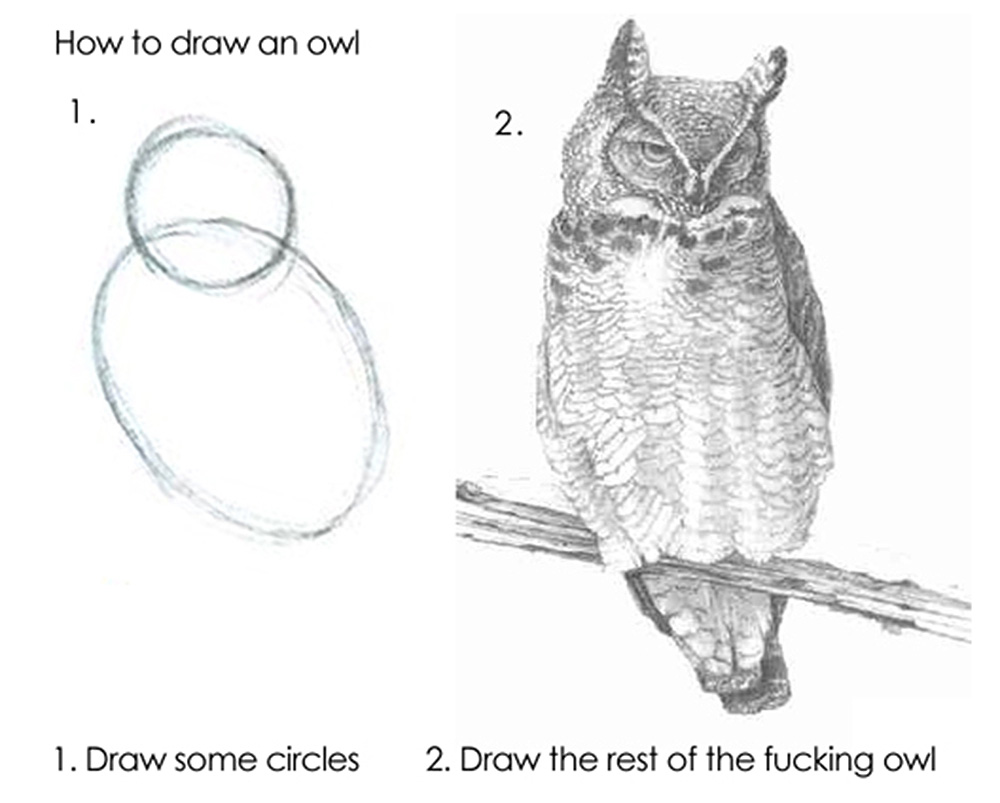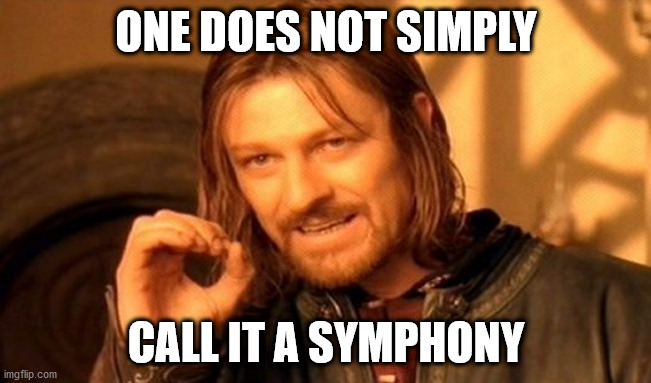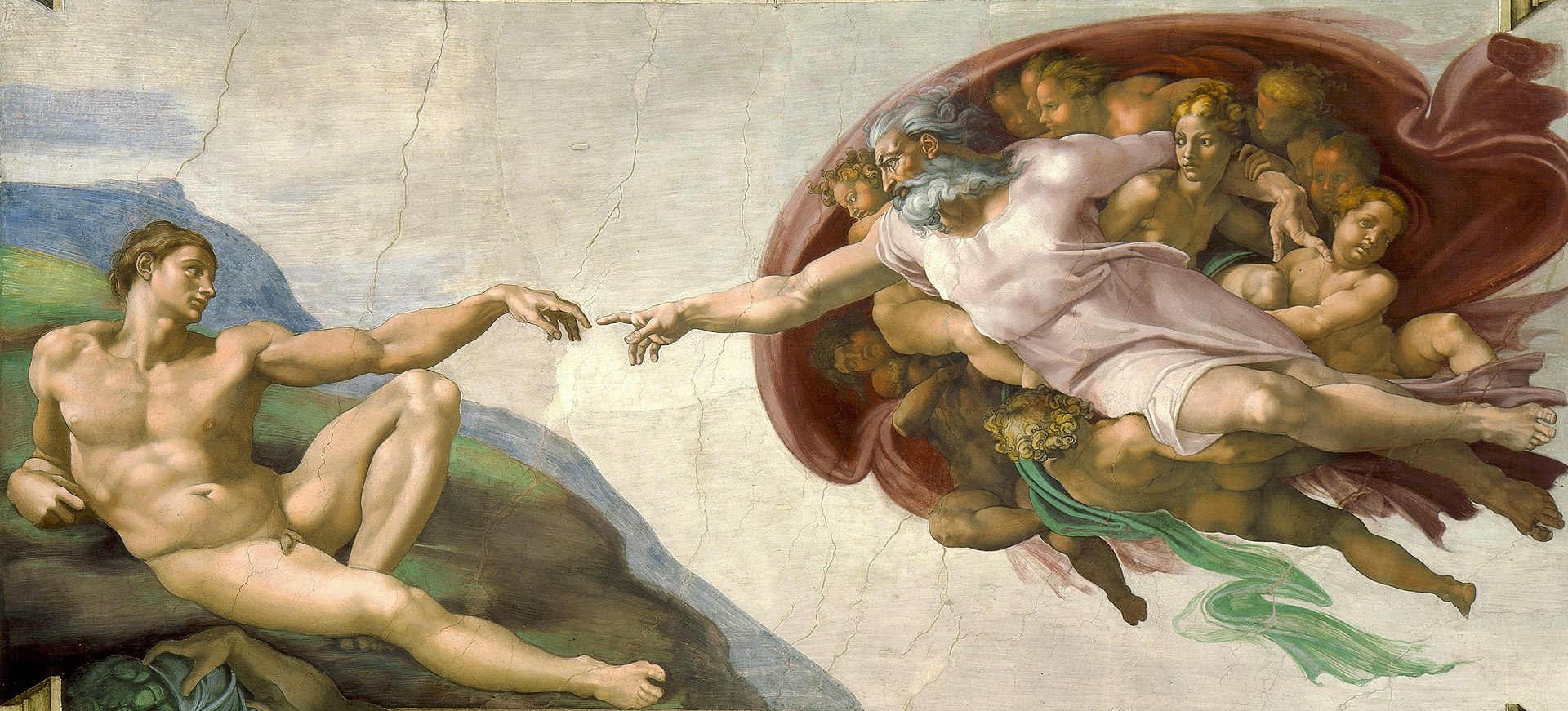How to write a symphony
or, how to draw the rest of the owl
This old article from WikiHow - How to Write a Symphony - did the rounds among musicians on social media a while back, to a lot of hilarity. It's probably a spoof, but who knows, these days? The Q&A remind me of the famous Three Wolf Moon t-shirt reviews.
It's not that the instructions provided are unreasonable, because they are basically fine:
Get inspired
Listen to composers you admire
Pick your themes
Create an outline
Gather your materials
Start writing
Assign melodies to different instruments
Give yourself a couple of days away from your symphony
Re-listen and revise
Get feedback
The objection (apart from the lack of historical context, of which more below) is more that one or two of these steps are deep in "Draw the rest of the fucking owl" territory.

Step 1, "Get inspired"
I did a TED talk on this topic and concluded that there was no such thing as inspiration, only making a start on something.
Step 6, "Start writing"
This is the actual "get inspired" step in my opinion, but it's also where your two circles need to be transformed into a fucking owl.
Step 4, "Create an outline"
To be fair, "Create an outline" is a very good piece of advice. It's just that in this context, while necessary, it is very far from being sufficient. Making an outline or skeleton of a creative project is essential - you need to be able to see where you are going, and what the rough lay of the land is. So many people just start writing something (a book, a song, a talk, or whatever) and have no idea where it's going, how long it will be, what it will achieve, where the high point will be, or even how it ends, and almost invariably it never gets finished, or if it does, it's shit. So, "create an outline" is brilliant advice. But it's not enough for this particular project - you will need to know how to make an effective outline, and a few other things besides.
So how would you do it then?
Having actually written a symphony, for what it's worth, how would I write a "how to" guide?
Superficially it's pretty easy:
Write some music
Call it a symphony
Or, OK, given what I just said about outlines being important:
Create an outline
Write some music
Call it a symphony
I'll write another blog post sometime on creating an outline. It's a genuinely important topic for any creative endeavour and deserves its own article! But here's the opening of a rabbit hole if you want to get going.
Write some music
Yes, that. Anyone, really anyone, can create a piece of music (usefully, the definition of "music" itself is rather stretchy). But for the purposes of writing an extended piece for orchestra in the Western classical tradition, at which after all the symphony lies at the heart, here are some technical pre-requisites:
Music theory: gain an all-round understanding of counterpoint and harmony from the 16th century to the present day, and the ability to practically use it, and get how it works over longer periods of time (even if your symphony is short, it's probably going to be a good 20 minutes in duration). I reckon this step even applies if you are going to write an atonal symphony.
Instruments: understand how each of the instruments you are going to write for are played, and ideally, be able to play at least one of them to a standard sufficient to have played in a few dozen different symphonies yourself.
Orchestration: know how the different instruments of an orchestra combine, have read the scores of, and listened through (multiple times) all the masterpieces of orchestration, and tried out lots of things on real players, and absorbed their abuse / feedback.
Other things that are pretty important include:
Lots of spare time when you can do the work (I had an entire pandemic lockdown)
A place you can work / concentrate in (as above, helps to be locked in)
Sufficient musical ideas to be developed over a lengthy piece of music (and some ideas on how to develop them, while keeping them interesting)
And last but most definitely not least:
Historical awareness, and a good reason why you are writing, specifically, a "symphony" and not just any old piece of music.
Call that a symphony?
This gets to the nub of the problem. This is why the WikiHow article was ridiculed by classical musicians, even if it isn't a spoof already. You cannot simply call something a symphony and walk away, satisfied that you have written a symphony.

Why not? I mean it just means "sounding together", it's just the name given to music played by several musicians together. "Symphonies" have been written and performed by popular beat combos. Isn't it just a name?
Well, sure, why not. "Symphony" didn't mean anything too grand in the early days. There's one, maybe two "symphonies" in Handel's Messiah (1741), and while justifiably famous they aren't the most famous bit. But if you are going to write a piece of music for an orchestra, these days, especially an orchestra consisting of classical musicians, to be performed in a concert hall alongside classical music, then it's a bold thing to do.
The thing is, there are (and this ought to be well known to you, if you are going to write a "symphony") some pretty awesome precedents for such pieces, by, among many others, Haydn, Mozart, Beethoven, Brahms, Tchaikovsky, Dvořák, Mahler, Shostakovich, Rachmaninov, Sibelius… the list of past masters of the symphony is long, and for each of them there are multiple examples of symphony masterpieces.
But just because so much has been done with the symphony, just because there are so many awe-inspiring, monumental precedents, does not mean that someone today cannot also contribute a symphony. That line of thinking would preclude anyone these days from writing a book - given that the history of literature has masters from Shakespeare to the Brontës, why should anyone today have the temerity to write a new book? Of course, there are plenty of modern masterpieces in literature to pick from, so it's just as well there are still plenty of writers brave enough to say "I have written a novel". Similarly, nobody would have painted or sculpted for the last half-millennium for fear of the reputations of Rembrandt and Michelangelo, but we're fortunate that they did.

In music it feels different, somehow. It's almost toe-curling to say "I have written a symphony". You can feel the raised eyebrows, the cringe, the "Have you now…", the slow backing out of the room - get away from the crank. Well, yes. So, you need to be ready for that, and know why you think you can contribute something that can at least do justice to what the symphony has become over the last, say, 250 years.
Perhaps you might say it doesn't matter what went before - it's what you do that counts. True. But if you call it a symphony, you are putting your work on the same shelf as those others. You could call it something else - "four pieces for orchestra" perhaps - or "the raven" - or "the year 1966" - or "my love of spoons" - whatever, and nobody would care. But call it a symphony, and you invite comparisons, so you'll want to be ready with answers.
What's your answer, then?
Yes, I wrote a symphony and yes I called it that. It makes reference to, draws upon, and respects, those that went before - it's in the same language that evolved over those centuries, but adds language from today. It draws on the past and knows that it requires the past for its existence but it is not of the past. It's a piece of today, using a language and medium that has evolved over time, but still presents a continuum. I haven't tried to "reinvent" the symphony - that really would be arrogant - but I have tried to contribute something new to the groaning table of symphonies past, because while there has been a Beethoven and a Shostakovich, their work absolutely rose out of their circumstances. They could not have imagined my circumstances or dreamt of the world as it is today, any more than I can understand Vienna or Leningrad under siege from the tyrants of those ages. Yet, their legacy is one that I (along with everyone else) has inherited, and I choose to use that inheritance to create my own contribution to the symphony, and use this language and form to say what I have to say about how I see the world of today.
So should you write one?
Half of the joy of "how to" articles and videos is never actually doing the thing described, and just enjoying the process of watching someone else do it. But if you feel motivated to write your own symphony, it's not my place to stop you! Go for it.
And as for the owl
So feel free to back away slowly now, if you like, get away from the crank! But I hope you'll give my fucking owl a listen one day, if you get the chance…